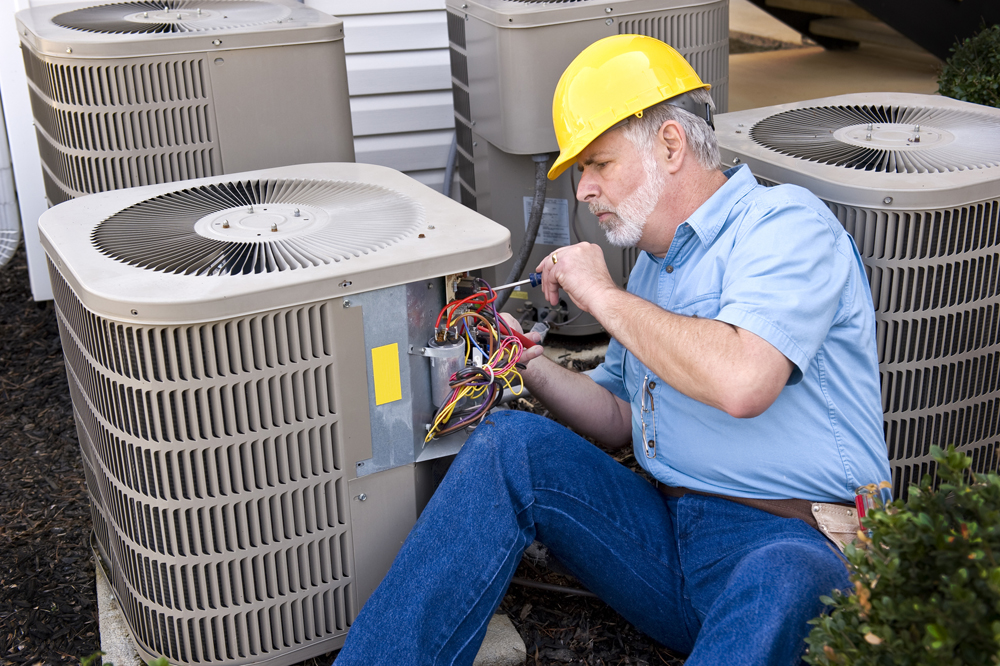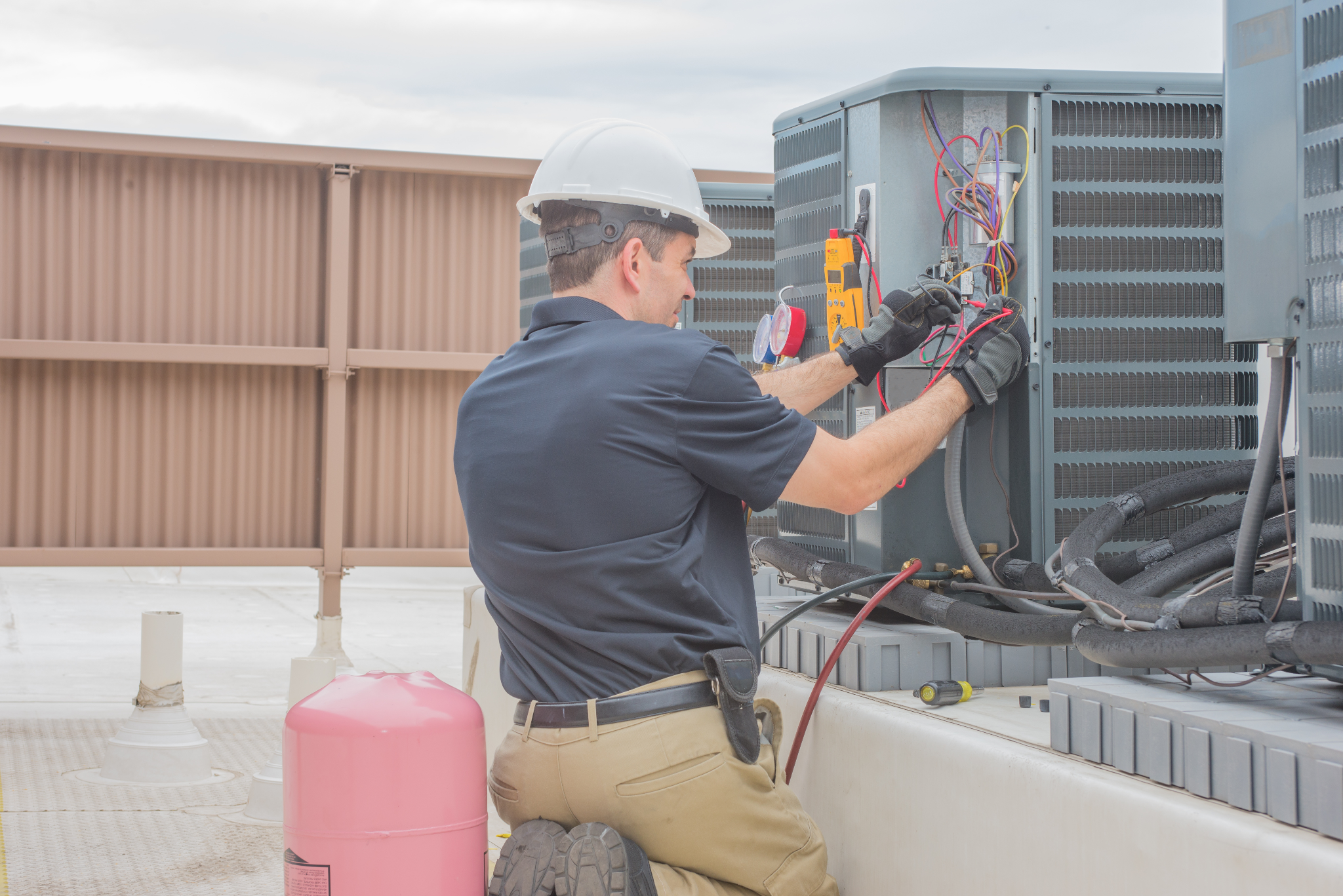Everything You Should Check During heat pump service
Everything You Should Check During heat pump service
Blog Article
Picking Between a Warm Pump and Heating System: Trick Factors To Consider for Your Cooling And Heating Requirements
When reviewing home heating choices for heating and cooling needs, the choice between a heatpump and a furnace can be complicated. Each system supplies unique benefits customized to specific climates and power performance objectives. Recognizing these distinctions is important for making an enlightened selection. Key elements such as setup costs and ecological effect further make complex the option process. Which alternative really aligns with one's comfort and sustainability preferences? The complying with sections will certainly check out these factors to consider thoroughly.
Understanding Warmth Pumps: How They Work and Their Benefits
While numerous house owners take into consideration various heating options, comprehending exactly how heatpump feature and their benefits can considerably influence their choice. Heatpump operate by transferring heat rather than generating it. In the wintertime, they draw out warmth from the outdoors air or ground and transfer it indoors, while in the summer, they reverse this process, cooling down the home by expelling heat outside. This dual performance makes them functional for year-round environment control.One of the primary benefits of warmth pumps is their power performance. They utilize significantly less electricity contrasted to conventional furnace, potentially resulting in lower utility costs (heat pump installation ooltewah tn). Additionally, heatpump have a smaller carbon footprint, making them an eco-friendly choice. They likewise call for much less maintenance than conventional systems, adding to long-term cost savings. Generally, comprehending the technicians and advantages of warm pumps can assist property owners make notified choices concerning their heating and cooling down requirements
Discovering Furnaces: Types, Procedure, and Benefits
Furnaces are available in various kinds, including gas, electric, and oil designs, each with unique operational systems. Recognizing these differences is necessary, as they influence performance and home heating efficiency. Additionally, heaters use many advantages, such as consistent heat outcome and integrity in chillier climates.
Sorts of Furnaces
Heating unit can differ significantly in layout and operation, with heating systems being a popular choice amongst home owners. There are a number of kinds of heating systems, each using various fuel resources and modern technologies. Gas heaters are typical, leveraging all-natural gas to generate heat successfully. Electric furnaces, on the other hand, utilize electrical resistance to produce warmth, commonly preferred for their simple setup. Oil furnaces, while much less common, work in locations with restricted gas gain access to (ductless mini splits). Additionally, condensing heating systems make the most of energy efficiency by reusing and capturing exhaust gases. Each type runs through a system of heat exchangers and ductwork to distribute cozy air throughout a home. Recognizing the distinctions between these heating system kinds is important for informed heating and cooling decisions
Advantages of Heating systems
For house owners looking for dependable heat during cold months, the advantages of furnaces are significant. Furnaces give regular heating, making certain also temperature levels throughout the home. They are particularly reliable in severe cool, typically surpassing heatpump in cold conditions. Numerous types, including gas, electrical, and oil heating systems, offer flexibility to satisfy varied demands and preferences.Furnaces additionally tend to have reduced initial installment prices contrasted to warm pumps, making them a more accessible choice for several. Their durable style adds to a much longer life-span, with numerous units lasting over 15 years with appropriate maintenance. Furthermore, modern-day heaters are commonly outfitted with advanced technology for enhanced effectiveness, which can lead to lowered power bills. Generally, furnaces continue to be a reputable option for reliable home heating.

Energy Effectiveness: Comparing Warmth Pumps and Furnaces
When contrasting energy performance in between heatpump and furnaces, the Seasonal Power Efficiency Proportion (SEER) plays a necessary function in identifying efficiency. In addition, an operational cost evaluation reveals the lasting monetary effects of each system. Understanding these variables can assist homeowners in making informed decisions concerning their home heating solutions.
Seasonal Energy Efficiency Ratio
Energy performance plays a necessary duty in the decision-making process between warm pumps and furnaces, specifically when thinking about the Seasonal Power Efficiency Proportion (SEER) This metric measures the cooling performance of heatpump over an entire air conditioning period, supplying a standard method to examine efficiency. Higher SEER rankings indicate higher energy effectiveness, converting to lower power usage and reduced utility bills. On the other hand, heaters are generally analyzed utilizing the Yearly Gas Utilization Efficiency (AFUE) ranking, which reflects heating efficiency. When comparing these 2 systems, house owners should prioritize SEER rankings for heatpump, as they straight impact overall energy financial savings and environmental sustainability. A complete understanding of SEER can especially influence the long-lasting satisfaction and cost-effectiveness of the selected heating and cooling solution.
Functional Price Analysis
Comprehending the functional expenses connected with heat pumps and furnaces is vital for home owners reviewing their alternatives. Warm pumps normally provide greater power efficiency, converting electrical power right into warm with very little waste. This results in lower monthly utility costs, particularly in moderate climates. On the other hand, typical heating systems, specifically gas versions, may have reduced ahead of time costs however can incur greater operational expenditures over time because of sustain rates and effectiveness ratings.Moreover, heatpump can operate as both home heating and cooling down systems, possibly decreasing the requirement for different a/c units. While preliminary financial investments for warmth pumps might be greater, their long-term savings in power performance can make them a much more cost-efficient choice for lots of houses. Cautious analysis of local power rates is important to establish the most effective alternative.
Installation Expenses: What to Expect for every Furnace
Setup prices for heater can vary substantially between heatpump and furnaces, affecting home owners' decisions. Heat pumps typically have higher upfront installment costs, normally varying from $3,500 to $8,000, depending on the device size and intricacy of installment. This consists of the outside device, indoor handling system, and essential ductwork alterations. Alternatively, heaters tend to have lower preliminary prices, balancing between $2,500 and $6,000, which can be appealing for budget-conscious property owners. However, installment costs can enhance if substantial ductwork is required.Moreover, the choice of gas type for heaters-- all-natural gas, lp, or electrical-- can likewise impact setup expenses. While warm pumps use energy performance, their initial financial investment might prevent some buyers. Ultimately, reviewing installment costs alongside long-term financial savings and effectiveness will certainly aid house owners in making educated choices about their furnace.
Environment Considerations: Which System Executes Much Better in Your Area
Exactly how do environment problems affect the efficiency of heating unit? The performance of heatpump and heating systems can vary significantly relying on the regional climate. In modest environments, heatpump stand out by efficiently moving warm from the outside air, making them an energy-saving alternative. Their effectiveness lessens in very cool temperatures, where they might struggle to draw out adequate warm. Conversely, furnaces, specifically gas designs, give reliable and regular warm no matter outdoor problems, making them more effective in cooler regions.In areas that experience milder winters months, heat pumps can run properly year-round, supplying both heating & cooling. In comparison, areas with severe winters commonly profit from the toughness of heating systems. Eventually, comprehending the neighborhood climate is vital when deciding in between a warmth pump and a heater, as it directly impacts their functional efficiency and general performance.
Maintenance Needs: Long-Term Look After Warm Pumps vs. Furnaces
While both warm pumps and heating find this systems require routine upkeep to guarantee peak performance, their certain demands and care routines vary significantly. Heaters usually need much less constant focus, with annual examinations sufficing to check for gas leaks, clean filters, and assess general capability. Their simpler layout commonly permits for uncomplicated repairs.In comparison, heatpump require biannual maintenance because of their twin function in heating & cooling. This ductless mini splits includes cleansing coils, inspecting cooling agent degrees, and making certain that both the interior and exterior units function at their ideal. In addition, warmth pump upkeep often includes more elaborate components, making specialist servicing essential.Neglecting maintenance can lead to reduced performance and enhanced energy expenses for both systems. Ultimately, property owners should think about these long-term care needs when choosing between a heat pump and a furnace, as positive maintenance can extend the lifespan and performance of either system significantly.
Environmental Influence: Choosing a Lasting Heating Option
The environmental impact of home heating systems is a critical evaluation for property owners looking for lasting choices. Heatpump are generally much more energy-efficient than typical heating systems, as they move warmth instead of generate it, significantly lowering carbon exhausts. By using renewable resource sources, such as geothermal or air-source heat pumps, home owners can additionally lessen their ecological footprint.On the other hand, all-natural gas heaters discharge greenhouse gases and contribute to air pollution, though they often offer higher warm outcome. Developments in technology have actually led to the development of high-efficiency heaters that lessen emissions.Ultimately, picking a heating system includes evaluating performance versus environmental influence. Homeowners are urged to assess regional energy sources and motivations for sustainable systems, ensuring a choice that straightens with both individual comfort and environmental duty. The choice impacts not only instant comfort yet additionally lasting sustainability and ecological health.
Frequently Asked Inquiries
The Length Of Time Do Heat Pumps and Furnaces Typically Last?
The life expectancy of heatpump generally varies from 15 to two decades, while heating systems can last between 15 to 30 years. Regular maintenance considerably affects their durability and performance in giving heating options.
Can I Use a Heatpump in Exceptionally Cold Climates?
Heatpump can operate in very cold environments, yet their effectiveness reduces as temperatures drop. In such conditions, supplemental heating sources might be necessary to maintain comfortable interior temperature levels and ensure peak efficiency.

What Is the Noise Degree of Heat Pumps Versus Furnaces?
The sound degrees of heat pumps and furnaces differ substantially. Usually, heatpump operate more quietly than typical heating systems, making them more effective for those conscious sound, while furnaces may generate louder functional sounds during heating cycles.
Are Heat Pumps Suitable for Both Cooling And Heating?
Warmth pumps are indeed appropriate for both home heating and air conditioning (heat pump service). They work by moving warmth, offering efficient temperature level control year-round, making them a versatile selection for homeowners seeking an all-in-one cooling and heating remedy
What Dimension Furnace Do I Required for My Home?
Figuring out the suitable dimension furnace for a home requires evaluating factors such as square video, insulation top quality, regional climate, and the home's layout. Consulting a professional can guarantee an Our site exact assessment and perfect convenience. Warm pumps generally supply greater energy effectiveness, converting electrical power right into heat with marginal waste. In modest environments, heat pumps excel by effectively transferring warmth from the outdoors air, making them an energy-saving option. Alternatively, furnaces, specifically gas models, offer trusted and consistent heat regardless of outside problems, making them preferable in cooler regions.In locations that experience milder winters, warm pumps can run effectively year-round, supplying both home heating and air conditioning. Heat pumps are normally extra energy-efficient than standard furnaces, as they transfer heat rather than produce it, considerably lowering carbon discharges. By using sustainable energy resources, such as air-source or geothermal warm pumps, home owners can further minimize their eco-friendly footprint.On the various other hand, all-natural gas heaters produce greenhouse gases and add to air pollution, though they commonly provide greater warmth result.
Report this page